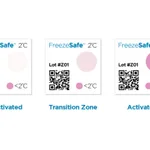| 상품 옵션 정보 | ||||||
|---|---|---|---|---|---|---|
| 카탈로그 번호 | 설명 | 상태 | 단위 | 가격 | 가격(VAT포함) | 수량 / 장바구니 |
| MP-PRO-00001 | Refeyn MP-PRO-00001 TwoMP set | 재고문의 | set | 0원 | 0원 | |
Refeyn TwoMP
The mass photomete
Mass photometry is a revolutionary new method of analyzing molecules. It enables the accurate mass measurements of single molecules in solution, in their native state and without the need for labels.
For molecular mass measurements with unmatched sensitivity, speed and simplicity of use, a TwoMP mass photometer offers wide mass range and single-molecule resolution.
- High-fidelity measurements of molecular mass
- Minimal quantities of sample required
- Intuitive acquisition and data analysis software
- Easy setup – a compact, benchtop instrument with minimum installation requirements
Key applications of the TwoMP
Protein-protein interactions

Antigen-antibody interactions are a prime example of molecular systems that can be studied using mass photometry, which can be applied to determine binding affinities for mono- and multivalent interactions.
Figure 1 illustrates how mass photometry can be used to quantify molecular interactions. By measuring the mass of the antibody trastuzumab and its target antigen, Her2, individually and in mixtures, the interactions between individual antibody molecules and target antigens could be quantified.
DNA-protein interactions

Mass photometry can be used to characterise DNA-protein complexes, which are crucial in gene expression, replication and DNA repair.
In this example, mass photometry not only allows detection of DNA binding but also provides information on how the oligomeric state of the protein changes upon DNA binding (Figure 2).
Protein oligomerization

Many proteins adopt a particular oligomeric form under certain conditions. In Figure 1, mass photometry characterises four different proteins: protein A, beta-amylase, urease and thyroglobulin. Through this characterisation, these proteins showcase a range of behaviours – from purely monomeric (as in Protein A) to a dynamic equilibrium between multiple states.
Complex formation

Ribosomes are macromolecular assemblies of protein and RNA, and are central sites for protein synthesis. Bacterial ribosomes (in this example from E. coli) are >2 MDa in size. Magnesium ions play a subtle yet important role in the assembly of intact (70S) complexes. In the absence of magnesium, E. coli ribosomes rapidly disassemble into their 30S and 50S subunits. Mass photometry allows us to monitor these processes (Figure).
Frequently asked questions
01.What type of biomolecules can I measure with the TwoMP?
The TwoMP has a wide mass range, allowing the study of different biomolecules, including proteins, DNA, RNA, large macromolecular complexes, nanostructures and even small viruses such as AAVs.
02.What are the optimization steps necessary for a mass photometry measurement?
The only optimization step necessary prior to a mass photometry measurement is to adjust the final concentration of the sample; the sample concentration on the instrument should be between 100 pM and 100 nM. The optimal concentration range for a mass photometry measurement is 5-20 nM.
03.Does the shape/conformation of my protein affect the mass measured?
For biomolecules within the mass detection range of the TwoMP (30 kDa to 5 MDa), the shape/conformation doesn’t influence the interferometric contrast and thus mass measured by the mass photometer.
04.If my protein of interest is fluorescent under the laser light, will it affect the mass measured?
In mass photometry, the mass measurement depends on the interference between the light scattered by the molecule and reflected light from the glass surface. This interference signal will be orders of magnitude greater than the fluorescence signal, so the mass measurement will not be affected.
배송/결제/교환/반품 안내
배송 정보
| 기본 배송비 |
| 교환/반품 배송비 |
|
|---|---|---|---|
| 착불 배송비 |
| ||
| 교환/반품 배송비 |
| ||
결제 및 환불 안내
| 결제 방법 |
|
|---|---|
| 취소 |
|
| 반품 |
|
| 환급 |
|
교환 및 반품 접수
| 교환 및 반품 접수 기한 |
|
|---|---|
| 교환 및 반품 접수가 가능한 경우 |
|
| 교환 및 반품 접수가 불가능한 경우 |
|
교환 및 반품 신청
| 교환 절차 |
|
|---|---|
| 반품 절차 |
|





